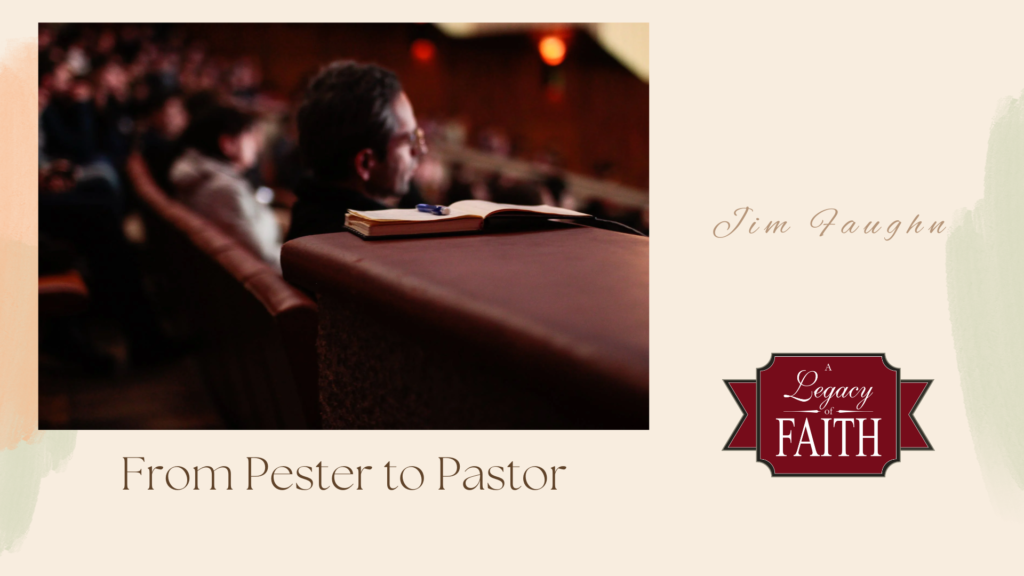From Pester to Pastor
For a little over two decades of my time as a preacher, it was not uncommon for people to refer to me as a pastor. While I didn’t want to offend anybody who was trying to show respect for me and/or my work, I also did not want to assume a role and/or position for which I was not qualified. So, in an attempt to use a little humor to (hopefully) make a point or cause somebody to think or ask questions, I often responded, “I’m just the pester.” Since a lot of people seem to think that preachers pester people about what they are doing wrong or not doing right, I usually got a laugh when I identified myself that way, but there was a serious point to be made along with my attempt at humor.
If you are confused, it may be because there is, in many circles, a misunderstanding of what the term “pastor” means. In the New Testament, “pastor” is not synonymous with “preacher” or “evangelist.”
The word pastor is used to describe a man who functions with other qualified men as pastors in a congregation of God’s people. It is not the only term used, however. Depending on the translation of the New Testament and the derivation and tense of the words, these same men are also called elders, bishops, overseers, and shepherds. That last designation can also be translated as pastors.
As we read the New Testament, we find that these men function together as a group. There is no mention in the New Testament of having only one of these men in a congregation. There is also no mention of having one of these men “overseeing” (being the bishop of) several congregations.
It is not my purpose here to use this space for a long, detailed study of Biblical terms and their uses. Rather, what I would like is for those who read this to consider just a few of the things we find in the New Testament.
Before you read any further, you may want to have a copy of God’s word nearby so that you can consult the following passages:
- Acts 20:1, 28-32 – In this passage, we read about the apostle Paul meeting with the elders of a local congregation and encouraging (or charging) them to feed (shepherd, pastor) their flock and to oversee it
- 1 Timothy 3:1-7 & Titus 1:3-9 – These passages inform us about the qualifications for those who would fulfill this role in a local congregation
- 1 Peter 5:1-4 – We can read here that Peter mentions his dual role as an apostle and an elder and writes about the role of elders being one of feeding (shepherding, “pastoring”) and oversight.
From those passages, some things are apparent about these men who are referred to as elders/pastors/shepherds/bishops/overseers. It might be helpful if we notice especially those two passages which mention qualifications. The word must is used. These are not mere suggestions, nor are they negotiable.
After you have (hopefully) read the passages above, it may become apparent, among other things, that pastors are all married men with some spiritual maturity and who have believing children. As you read and consider other New Testament passages, it should also become apparent that it might be (and is) possible for a single man, a married man with no children, and/or with children who are not believers to be a preacher.
The world has been blessed with many such men who might be qualified to preach, but who do not meet the qualifications necessary to serve as pastors. Two who come to mind were coworkers with the apostle Paul. As far as I am able to determine from scripture, while both Timothy and Titus were effective preachers, there is no record of them being married. That would mean that they could not serve as pastors.
In short, there are differences between the qualities or qualifications that men need to have in order to honor God’s plan for these two works. Without getting into a lot of detail with this, the New Testament teaches that the responsibilities of these men also differ.
Given my personality, I guess that I’ve been a pester all of my life. It really does not take much effort to do that. Most of the time, I’ve had some fun with that. However, in the interest of “open disclosure,” I’ve also gotten myself in trouble with that a few times.
If the Lord decides to keep me around for just a few more days (December 21st), I will have been a pastor for the past twenty years. Unlike having fun with being a pester, watching for the eternal souls of people is very, very serious. It takes more effort, thought, and – most especially – prayer than I ever could have imagined before I began to try to serve in this capacity.
I would like to make a request as I begin to bring these thoughts to a close. It has nothing to do with my “anniversary date” mentioned earlier. That fact just sort of “hit me” a few days ago and served to prompt what I am writing here.
The request is not merely for me. I am including in my request the other two men with whom I serve in our congregation and who I see multiple times each week and with whom I communicate often when we are not together.
The request isn’t even limited to them. I am also making the request for men I will probably never meet in this life. This request is for all who serve in the same capacity as the one in which I attempt to serve.
Please pray for us.
We need that more than you might ever be able to imagine
and it might help more – and in more ways – than you will ever know.
AUTHOR: Jim Faughn
